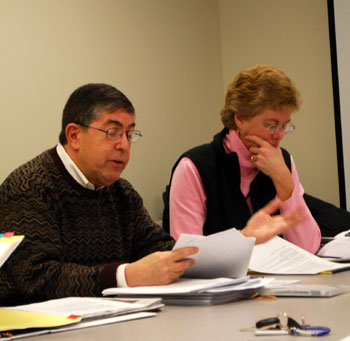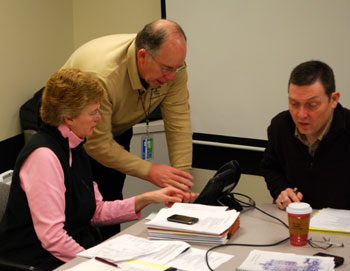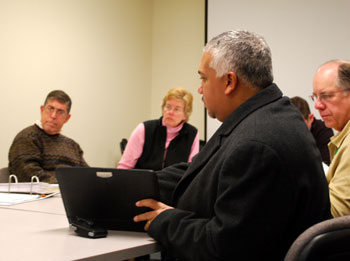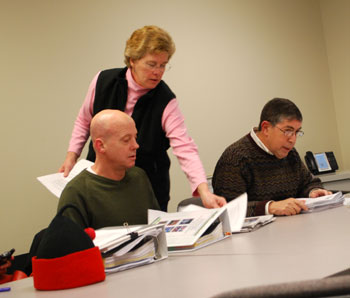Library Lot Math: 6 – 2 + 2 = 6
At its Friday morning meeting, the committee responsible for evaluating development proposals for the Library Lot agreed to reconsider two of the proposals previously rejected.

Sam Offen reads a section of the Library Lot RFP that he interpreted to mean that financial considerations should come later in the process. At right is Jayne Miller, community services area administrator. (Photos by the writer.)
The suggestion for reconsideration had been brought to the committee by two of its members, Margie Teall and Stephen Rapundalo, who also serve on the city council. Monday’s city council meeting had included conversation about the issue.
The committee will now re-include in the interview process the two proposals it had eliminated at its December meeting. Representatives for all six proposals to develop the top of the Fifth Avenue underground parking structure will be interviewed in a little less than two weeks. On Jan. 19, the two that had been dropped previously – proposals that call for predominantly open space in that area – will be interviewed, followed on Jan. 20 by interviews of the other four proposers.
Related to this process, at its Wednesday meeting the Downtown Development Authority had approved up to $50,000 for a consultant to assist with the review of proposals. So on Friday, the committee was also briefed on the request for qualifications (RFQ) for the consultant, which has now been released – and no candidates with operations in Washtenaw County will be considered.
Re-integration of Two Proposals
By way of background, on Aug. 14, 2009, the city of Ann Arbor issued an RFP for the development of the city-owned Library Lot – above the underground parking garage currently under construction, and directly to the north of the downtown library. At last Wednesday’s Downtown Development Authority board meeting, chair John Splitt reported that beginning the week of Jan. 25, 2010, people could expect to see “the big drill” – marking the commencement of earth retention work
Timeline Overview of RFP
A timeline overview of events related to the Library Lot RFP, including Friday’s meeting:
- Aug. 14, 2009: RFP issued.
- Sept. 25, 2009: Pre-proposal meeting, mandatory for anyone who wanted to submit a proposal.
- Nov. 13, 2009: 2 p.m. EDT RFP response deadline; six proposals submitted before deadline; one proposal misses deadline.
- Dec. 4, 2009: RFP review committee meets, handles organizational and scheduling matters.
- Dec. 18, 2009: RFP review committee meets after initial review of proposals, drops two: Ann Arbor Town Square and Ann Arbor Community Commons. [Chronicle coverage: "Two Library Lot Proposals Eliminated"]
- Jan. 4, 2010: Ann Arbor city council contemplates but rejects a resolution asking for information from dropped proposals; council representatives to RFP review committee (Teall and Rapundalo) agree to bring suggestion to RFP review committee for reconsideration of dropped proposals. [Chronicle coverage: "Mixed Message from Council on Library Lot"]
- Jan. 8, 2010: RFP review committee meets, agrees to re-integrate dropped proposals into interview process scheduled for week of Jan. 18.
Committee Deliberations on Re-Integrating Proposals
At Friday’s meeting, the first order of business introduced by Stephen Rapundalo, who chairs the RFP review committee, was the question of whether to reconsider the two previously dropped proposals.
Rapundalo summarized the rationale behind the failed city council resolution that had been brought forward by Sabra Briere (Ward 1) by saying that it was Briere’s intent that councilmembers have adequate information to compare all proposals.

Jayne Miller, Roger Fraser and Stephen Rapundalo tried briefly to connect by speaker phone to Eric Mahler, who was on his way to the meeting, but the attempt was ultimately unsuccessful.
Rapundalo told the committee that those on council who opposed the resolution cited their sense that the information requested – on the proposal’s financials – had already been asked for in the RFP. In addition, he said, there was some sentiment on council that the resolution would undermine the RFP process.
Nevertheless, said Rapundalo, based on conversations he’d had with mayor John Hieftje and his city council and RFP committee colleague, Margie Teall, he was bringing the committee the suggestion that the two dropped proposals be re-integrated into the interview process.
Committee member Sam Offen responded to Rapundalo by saying that he’d read about the city council meeting and re-read the RFP to see if the committee had done something different from what had been set forth in the RFP. He pointed to a paragraph on page 10, which he took to mean that the committee should first consider the proposals based on their merits other than their acquisition costs. Offen concluded that a reasonable argument could be made that it was premature to exclude a proposal on a financial basis, and that it was worthwhile to reconsider the two dropped proposals.
The paragraph cited by Offen reads as follows:
The selection committee will initially evaluate responses to the RFP to decide which submitters, if any, it will interview. For the initial evaluation, the committee will not consider acquisition cost proposals. For this reason, the acquisition cost proposal must be separately submitted in a sealed and marked envelope. Before the interviews, the acquisition cost proposals of the submitters to be interviewed will be opened and reviewed.
City administrator Roger Fraser clarified that what they’d been thinking about with that paragraph were proposals to purchase the property – to make it clear that the city was not soliciting offers of speculative development.
John Splitt, who’s chair of the DDA board and serving on the RFP board along with DDA executive director Susan Pollay, said he was not in favor of reconsidering the proposals. Neither showed any possibility of financial return to the city, he said.
Splitt asked for examples of revenue-generating parks in Ann Arbor. Offen, who serves on the city’s park advisory commission, and Jayne Miller, who is community services area administrator, had a working knowledge of Ann Arbor’s parks financials sufficient to answer Splitt’s question. The canoe liveries, said Offen, have revenues greater than expenses. Miller allowed that was true, but noted that because the parks are supported from the general fund, there is a certain amount of overhead that is subsidized for any of the parks.
Miller gave the Ann Arbor Farmers Market as the one example of a park that was revenue positive for the city.
Margie Teall said she agreed with Splitt, but that it was not asking too much of the committee to ask questions that had not yet been asked of the proposers. She also acknowledged that arguments could be made about a financial return to the city based on economic development.
Susan Pollay put the dropping of the two proposals in the context of a winnowing down of more proposals – even without the aid of a consultant. She inquired about the proposal by Jarratt Architecture, as one that might also have been dropped from consideration – it contained descriptions of what Jarratt would try to do, as opposed to what they were going to do. In the Jarratt Architecture proposal, she said, “there’s not a lot of stuff.”
Rapundalo allowed that there was a real question of which proposals had enough substance to merit further consideration. He reported that Eric Mahler (who had not yet arrived at the meeting) had been prepared to cut the Jarratt proposal as well.
Splitt also described the process as one where there would be further eliminations – two didn’t make the first cut, others would not make the next cut, he said.
Much later in the meeting, Eric Mahler arrived and echoed similar sentiments to Splitt’s – he was against reconsidering the proposals they had already dropped. [Mahler also serves on the city's planning commission.] Mahler enumerated the reasons he was against reconsideration, which were based on the substance of the two proposals – they envision the Library Lot as predominantly open space.

Eric Mahler, foreground, arrived towards the end of the meeting and spoke against reconsidering the two Library Lot proposals that were previously eliminated.
First, Mahler said, he had concerns about spreading resources too thin with respect to security in an additional park. Second, to be successful, he cautioned, any urban park had to be especially well thought out with respect to planning, security, maintenance, and building. Finally, he did not think that the two proposals met the criterion that they be at least revenue neutral.
For his part, Rapundalo said that one of the “occupational hazards” of being a scientist with 30 years of experience doing peer review was being accustomed to following processes with rules – to him, reconsideration offered up a second chance to proposers already eliminated. [Rapundalo was a Ph.D. research scientist with Pfizer before taking over as head of MichBio].
The question of the proposal that came in late would be briefly raised by Teall, but missing the deadline was seen as an objective criterion – “a deadline not subject to interpretation,” said Splitt.
Despite his opposition, Rapundalo said, out of respect for his council colleagues and the fact that it represented only three additional hours of interviewing time [90 minutes for each], he was willing to go along with reconsideration of the two dropped proposals. Teall also noted that they were only talking about a total of six proposals – not, say, 22 of them.
While Mahler and Splitt both expressed their opposition to reconsideration of the proposal, they both indicated that they were willing to see the proposals included in the interview phase. Mahler stressed that he would go into the interview process with an open mind to the two proposals that were being re-included.
Rapundalo concurred with Mahler that it was important for the proposals to rise and fall on their merits.
The Interviews
Much of the committee meeting dealt with the logistics of the interview process, which will take place on Jan. 19-20.
Interviews: Where?
Jayne Miller reported that she’d confirmed the space availability of the downtown location of the Ann Arbor District Library, at 343 South Fifth Ave., for the interviews on Jan. 20 and that she’d be able to hold a partial day for Jan. 19 in the event that the two dropped proposals were reconsidered. That prompted Rapundalo to remark: “That’s thinking ahead.”
Interviewers: Who?
Rapundalo said he’d invited Josie Parker, the director of the library, as well as Michael Ford, CEO of the Ann Arbor Transportation Authority, to take part in interviewing the proposers, though they would not participate in committee deliberations.
For each proposer, the interview process will include a 30-minute presentation, 30 minutes of questions and answers by the committee, concluding with 30 minutes of questions and answers by the public. The public’s questions, Rapundalo said, would be taken on cards, in order to squeeze in as many as possible.
On the evening of Jan. 20, following the interviews, there will be an open house – proposers will each have a table where they can have their material set up, with people able to circulate among the tables.
Jayne Miller said she’d draft a form that could be used by open house attendees to record feedback to the committee.
Interview Questions?
While the public’s questions will be submitted on written cards, the committee’s questions will be sent in advance to proposers. That was a decision for which there was not complete consensus at the start of the committee discussion.
Rapundalo said he was inclined to provide the questions in advance. Sam Offen wondered if a proposer could then use the first 30 minutes, allocated for their presentation, to answer the questions. Remarked Rapundalo in response to Offen, “They will, if they’re smart!”

Jayne Miller distributes handouts to John Splitt at the start of the meeting. Seated to Splitt's left is Sam Offen. Seated to his right, out of camera range, is the owner of the red and black hat.
City administrator Roger Fraser wondered if it was really desirable to “tip your hand” about the questions. For example, he said, if there was a question about how the proposal fit into the overall context of the area, then something a proposer had not thought to make a priority could suddenly be come a “priority.”
The committee settled on sending the questions to proposers in advance of the interviews. One consideration in that decision was the observation by Splitt that one of the proposal teams was in the room, even as the committee was discussing the draft of some of the questions – Alice Ralph and Alan Haber of Ann Arbor Community Commons have been attending these committee meetings.
Committee members gave Jayne Miller feedback on the question set that she’d drafted. Susan Pollay suggested in general that the tenor of the questions needed to demand concrete responses – she drew the contrast between, “What are you willing to do?” and “What will you do?” A question about financing, Pollay said, should ask specifically which banks the proposer had worked with in the past.
Rapundalo urged that some of the questions cut across all proposers to ensure some basis of comparing “apples to apples.” Teall wondered why LEED Silver was a part of one question instead of LEED Gold. At that, Fraser and Miller suggested that they could as well ask about LEED Platinum.
Committee members will now send Rapundalo specific suggestions on Miller’s draft, he’ll collate them, and forward them to Miller, who will take another stab at the question set.
After the Interviews and Open House
Besides the interview questions, Miller will be refining the draft of a form for each proposal that committee members can use for implementing the scoring metric outlined in the RFP. [Link to city website with RFP and .pdf files of all six proposals.]
Fraser stressed that the idea in applying the scoring metric was not to use information from only one step in the process. The metric should be applied, he said, based on the response to the RFP, the responses to follow-up questions the committee had asked for, plus the interviews.
The RFP review committee will meet the day after the interviews conclude, on Jan. 21 from 6-9 p.m. to analyze the information collected to date and to discuss their next steps.
RFQ for Consultant
At the Downtown Development Authority’s monthly board meeting on Wednesday, up to $50,000 was approved to fund a consultant to help evaluate the Library Lot proposals. [Chronicle coverage: "DDA Ponies Up: Parking, Pipes, Planning"]
At Friday’s RFP committee meeting, Miller and Fraser indicated that the request for qualifications for a consultant had been posted on BidNet and sent to the International Downtown Association.
At the DDA’s Wednesday board meeting, DDA board member Gary Boren had said that the consultant who would be hired would have “no skin in the game.”
One of the criteria in the request would exclude local consultants:
The City of Ann Arbor must avoid any perception of influence or conflict on the part of its consultant. Therefore, the city will only consider submittals from professionals that have no operations based within Washtenaw County, and where these professionals have no financial ties or any other potential conflict of interest with any member of any project team who has submitted an RFP to the City for its Library Lot project.
Responses from potential consultants are due Jan. 13, 2010 at 2 p.m.




“City administrator Roger Fraser clarified that what they’d been thinking about with that paragraph were proposals to purchase the property – to make it clear that the city was not soliciting offers of speculative development.”
If speculative development is not desired, why were the conference center proposals not immediately rejected by the committee? They rely on public financing and public assumption of risk. For example, the Valiant proposal indicates that payments to the City are dependent on when, if, and for how much the condo portions of the project are sold. Isn’t that the definition of speculative?
The Valiant proposal and the Acquest proposals both require the City to finance the conference centers with bonds. Valiant says conference centers rarely cover their own debt. That’s not even speculative. That’s practically a guarantee that the tax-payers will lose.
I really don’t understand the fluid criteria this committee is using to judge these proposals, but I’m glad they’ve at least agreed to allow all six proposals to be further vetted, and if only to a very small degree, by the public.
A key component of the timeline for this process is missing from the article: public commentary at council caucus and at other times. Councilmembers Rapundalo and Teall didn’t act in a vacuum, nor were the mayor and councilmember Briere the only people who suggested reconsideration. I appreciate the efforts of the unmentioned citizens who opened the eyes of council on this matter.
Mahler’s comments, as reported here, don’t seem to demonstrate open-mindedness about the two proposals in question. Rather, the fact that he referenced concerns about management of park space as two of his three reasons for opposing reconsideration of the proposals demonstrates an assuming mindset if not prejudice. Also, as the Chronicle noted, two people with direct knowledge of parks operations in the city were in the room. Mahler apparently chose not to ask for their opinion on his maintenance and security concerns. (I understand that his late arrival might have precluded questions at that point in the meeting.) I hope he’s able to follow through on his intention to be more open minded during the interview process.
Splitt, to his credit, did ask a question of Miller and Offen. Interesting that his comment that neither of the proposals showed possibility of financial return was countered by their response. What’s not clear is whether he had been making an assumption similar to Mahler’s or if his comment was based on an interpretation of the content of the proposals.
Rapundalo’s statements are also interesting. On the one hand he considers this a second chance for the two proposals (as opposed to a first chance, as some might argue.) On the other he demonstrates a desire to compare apples to apples across proposals.
This is the nature of this sort of process. It’s easy for me to sit here with the luxury(?) of time to examine and analyze the proceedings and the participation of others. The truth is that they’re doing the work (which is a considerable time commitment), and I appreciate it. The challenge for us all as members of the same community is to be patient with each other as we all do our best — and still stumble and contradict ourselves at times. Taking a little more time (it may be a necessity rather than a luxury) and asking for a little more feedback can help, as can pointing out the contradictions when we see them (as I hope I’ve succeeded in doing without animosity.) And certainly, being open to reconsideration, as council and the committee’s chair and its members all appear willing to do, is in the best interest of the community.
One last observation: The library and AATA were asked to join in the interview process but other neighbors (e.g., Earthen Jar, Seva, the UM Credit Union) were not. What do you all think about that?
Thanks to Sam Offen for actually reading the language of the RFP!